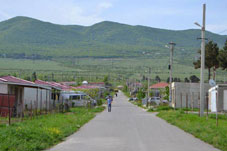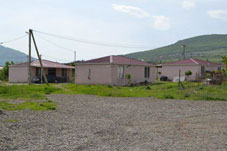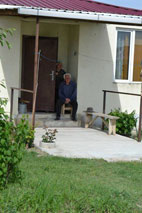
A place without the right of choice
By Tatia Megeneishvili
Friday, May 16
Georgia is a country with 20% of its territory occupied and thousands of internally displaced people. As a result of the military actions that took place in August 2008, 192,499 people left their permanent residences. Approximately, 2,000 families now live in special settlements built especially for them.
Little gray houses with red roofs look almost the same as they did six years ago. 200 houses have been built in each location, with 200 additional houses used for processing, and each family that has received one gets 400 square meters of land.
Rafik Amurov, 80, lives in one of the houses located in Tserovani. “Both me and my wife are ill and cannot do much; even if we could the land is too small and not enough to grow anything. We have 45 GEL state assistance each so that even the total 90 GEL is never enough even for medicine. That is why we are not able to pay our gas bill, approximately 450 GEL. We not only have this problem, but also the location has gas debts. No one cares about us,” the old man said in tears.
The majority of people say that unemployment is their main problem. They say some people were able to find jobs in Tbilisi and Mtskheta, but for the most part still have nothing to do. Most of the youth feel they have no perspectives.
People also have water problems. “This problem is getting harder during summer, because people use drinking water for irrigation, and the upper part doesn’t have enough water for drinking,” Manana Gabitashvili, IDP from Akhalgori said.
Governor of Akhalgori, Nugzar Tinikashvili, said that he and his team are working on solving the problems. “People here have many problems. I really am new here, but I am already trying my best to help them. We are already working to find money for the irrigation system. But for me one of the most important problems is that the filtration collector is out of order,” he said explaining that the former government said that they wasted 2.5 million GEL for building the collector, but it has stopped working two years ago.
“Since then, the fecal materials are going right in the rivers. This may cause many ecological catastrophes. We already had an expert here, who made plans and soon works will be launched,” Tinikashvili stated.
Tinikashvili also spoke about the insurance system. “Before, because of GPI Holdings insurance system people could only go to some particular hospitals and doctors. Now step by step we will have universal insurance and people will have the free will to choose where to go and get treatment,” he explained.
The material was prepared within media tour, within the framework of the Regional Civil Society network (R-CSN) and facilitated by the non-governmental organization CIDA.



